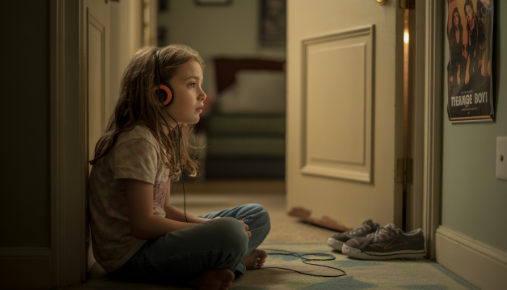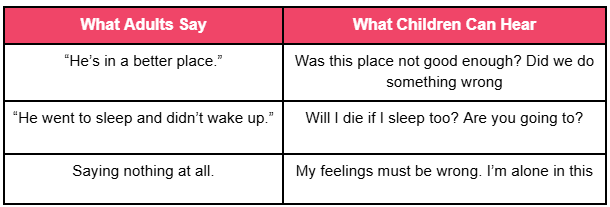September 5, 2025
How to Have Conversations About Death With Children and Teens
How to Have Conversations About Death With Children and Teens
Do you ever wonder why we become so deeply immersed in stories? Maybe it’s because they help us hold big feelings without breaking. That’s why I’m sharing this topic as a story, because the real version can hurt too much. The people aren’t real, but the love and the grief are.
It begins with a moment parents pray they’ll never face: sitting with their children to explain that their older sister died. How do you say, in words a child can hold, that someone they love will not walk back through the door, and yet will never leave? We try to name the two truths at once: they are no longer physically here, and they are always with us, in stories, precious memories, and photos, in the rituals we keep, in the way love keeps speaking their name.
Though this is Ellie’s imagined journey, it speaks to a universal experience of grief, healing, and the quiet conversations we often leave unspoken. This story belongs to no one person and, perhaps, in some way, it belongs to us all.
A Story of Fireflies, Echoes, and the Silence We Inherit
Some moments split life into before and after.
Before the loss, there’s rhythm to life, bedtime giggles, inside jokes, a shared bowl of popcorn.
After that, the air feels heavier, as if even the house has forgotten how to breathe.
We often think kids don’t understand that death is forever. They do. They notice the quiet and how the adults change. They just don’t have the words or tools to explain it yet.
When we go silent, kids write their own versions. Those stories can sting more than the truth.
This is Ellie’s story. But it could be any family’s.
The Day the Laughter Stopped

Twelve-year-old Ellie sat on the carpet outside her brother’s room, listening for music that would never play again.
Lucas should’ve been in there, doodling comics, tossing socks at her head, yelling “privacy!” when she barged in uninvited.
But the door stayed shut. The house stayed still.
Three days earlier, Lucas had drowned in the lake behind their cousin’s cabin.
He'd dared a backflip off the rope swing. The splash came, but he didn’t resurface.
No one saw it coming. No one knew what to say.
Ellie wasn’t told he had died, not directly.
She was told, “It was an accident.”
She was told, “He’s in a better place.”
She was told, “Everything’s going to be okay.”
But it wasn’t.
At the funeral, she saw adults passing tissues. They looked at her, then looked away.
And she realized something heartbreaking: no one wanted to say his name.
So she stopped asking.
She stopped laughing.
She stopped being a child.
The Grief We Don’t Talk About
Her mother didn’t cry in front of her.
Her father buried himself in work, disappearing behind spreadsheets and shallow smiles.
The grief was everywhere, but never named. Never discussed.
Just felt.
Ellie began to think grief was something shameful.
Something to hide.
At night, she tried to draw, like she and Lucas used to do together. But every page stayed blank. Every pencil felt too heavy.
Until one evening at dinner, her mother said, “Please pass the salt,” and Ellie snapped.
“You can say ‘salt,’ but you can’t say ‘Lucas’?!”
The silence that followed said everything.
The Hill Where Echoes Live
Ellie ran to the old hill behind their backyard.
It was where Lucas had taught her to ride a bike, where she scraped her knees, and he cheered anyway.
Now it felt haunted.
She stood there, fists clenched, whispering to the night, “Are you really gone? Were we just pretending forever?”
Rain began to fall. The sky opened, like it had been holding back too long.
That’s when she saw it.
A flicker.
Not lightning. A flashlight, waving from the base of the hill.
Her grandfather.
He approached slowly, holding out the light.
“Lucas once told me this was how fireflies talked,” he said, blinking the beam in an odd rhythm.
Three short flashes. A pause. Two more.
“He said it meant ‘I miss you too.’”
For a second, Ellie smiled. Then the dam broke.
She sobbed so hard she couldn’t breathe. She dropped to her knees in the mud.
Her grandfather didn’t shush her. He didn’t tell her to be strong.
He just sat beside her.
When the sobs turned to hiccups, he said gently, “You don’t have to carry this alone. You’re allowed to fall apart.”
Inherited Silence
Back in the warmth of the house, wrapped in towels, Ellie asked him, “Why doesn’t Mom talk about him?”
Her grandfather looked away. “Because no one talked to her when she lost her mom. My wife. Your grandmother. We all kept quiet, thinking it was the right thing to do. But silence doesn’t shield. It isolates.”
Ellie nodded slowly. “So you all just… stopped saying her name?”
He nodded. “And it swallowed us whole.”
That was the moment Ellie realized grief wasn’t just an emotion. It was a legacy.
You either pass it down as pain or transform it into permission to feel.
The Questions Children Are Afraid to Ask (But Still Do)

What to Say Instead—and Why It Matters

The Healing Begins
Weeks later, Ellie asked if she could light a candle for Lucas every Friday. Not in silence but with music. His playlist.
Soon, her mom began to sit beside her.
Sometimes they talked. Sometimes they cried.
Sometimes they just listened.
Her dad joined them eventually.
And for the first time in weeks, Ellie heard her mom laugh, a short, cracked laugh at a joke Lucas once told.
It wasn’t everything.
But it was something.
And that’s how healing starts.
Years Later
Ellie didn’t forget.
She didn’t “move on.”
But she moved with it.
She grew up to become a grief educator. Not because she had all the answers, but because she remembered what it felt like when no one offered any.
Every session, she began the same way:
“If your grief could speak, what would it say today?”
Some kids drew monsters. Some drew fireflies. Some just cried.
And she listened.
Takeaways: Lessons Hidden in the Silence
- Silence is not protection—it’s disconnection. Children don’t need perfect answers. They need an honest presence.
- Children grieve in bursts. One day they’ll laugh. The next, they’ll scream. Let both exist without judgment.
- Words matter. Euphemisms confuse and frighten. Clarity, age-appropriate language, and emotional permission provide safety.
- Grief is not a moment—it’s a process. And in that process, children need adults who show up, not just show strength.
- Art helps children process what words can’t. Offer crayons, memory boards, clay, music, or movement so feelings have a safe way to come out.
- Grief can be transformed. From pain into meaning. From silence into ritual. From fear into conversation.
The Final Light
One summer night, Ellie lay on the same hill. This time with her own daughter, who pointed excitedly at the blinking lights around them.
“Fireflies!” she said. “They’re talking!”
Ellie smiled. “Yep. And you know what they’re saying?”
Her daughter squinted, curious.
“They’re saying: I miss you too.”
Because even when a firefly disappears…
Its light lingers.
OUR MISSION
We are a nonprofit founded in honor of Jenna Betti, funding programs to empower and inspire people to thrive despite adversity.
Need Support Now?


